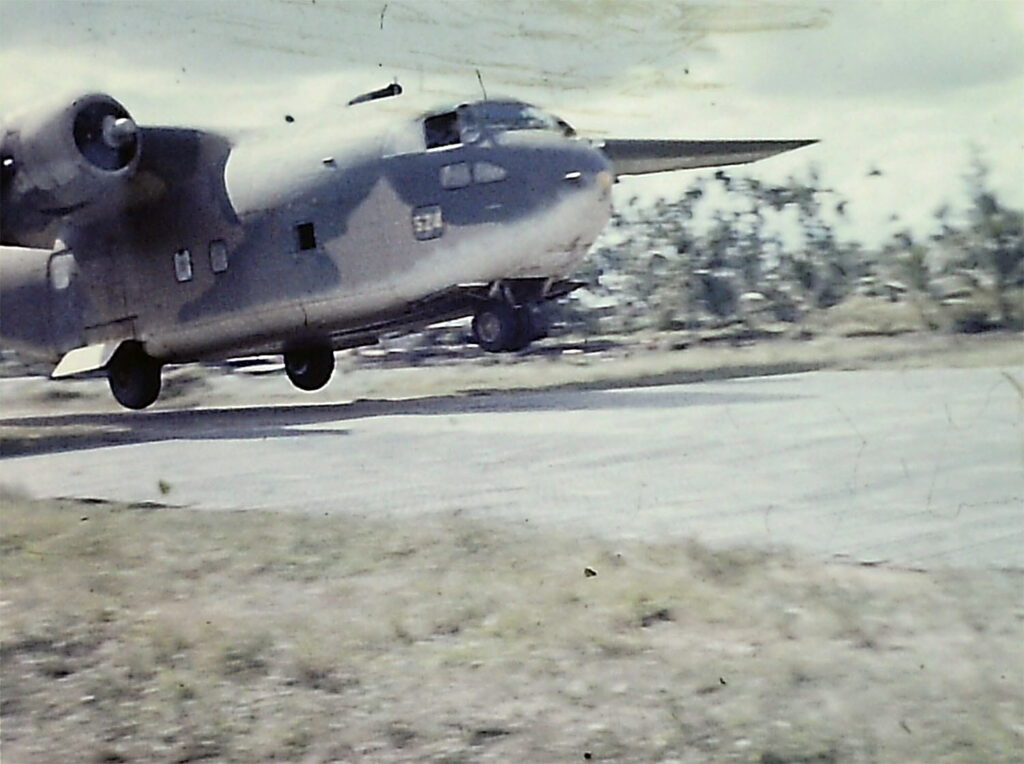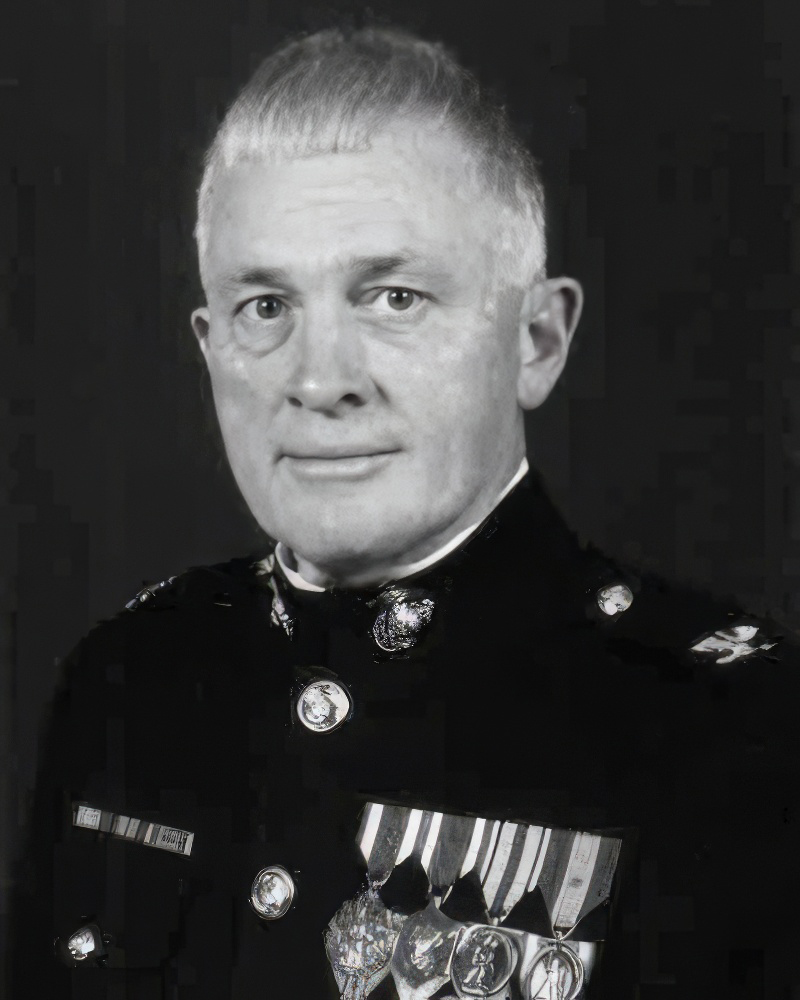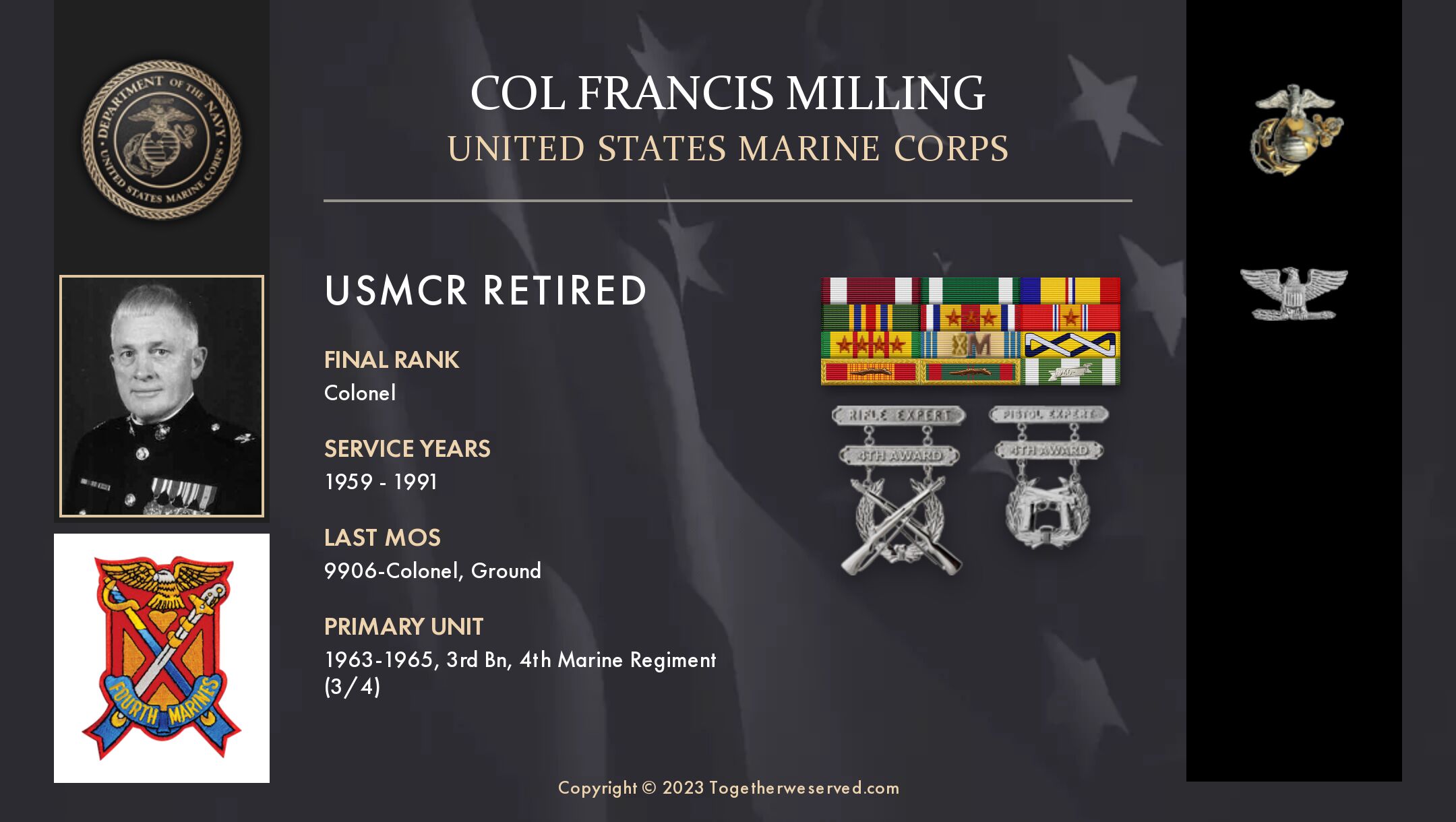PRESERVING A MILITARY LEGACY FOR FUTURE GENERATIONS
The following Reflections represents Col Francis Milling’s legacy of his military service from 1959 to 1991. If you are a Veteran, consider preserving a record of your own military service, including your memories and photographs, on Togetherweserved.com (TWS), the leading archive of living military history. The following Service Reflections is an easy-to-complete self-interview, located on your TWS Military Service Page, which enables you to remember key people and events from your military service and the impact they made on your life. Start recording your own Military Memories HERE.
Please describe who or what influenced your decision to join the Marine Corps.

My decision to join. I had two first cousins in the Corps. One was a para marine, and he was an Infantryman when they disbanded. He served on Iwo Jima, and I once asked him how long he was on Iwo, and he said, “Oh, about 30 minutes.” He was severely wounded and medivac’ed.
Whether you were in the service for several years or as a career, please describe the direction or path you took. What was your reason for leaving?

Career path & reason for leaving. At the end of Officer Basic School, I requested an Infantry MOS and Hawaii (4th Marines, First Marine Brigade) for a duty station, and I got both. My first job there was as Platoon Commander in K/3/4. Hawaii was Heaven on earth from 1963-1965.
Hawaii was my favorite duty station. I had no least favorite; I loved every minute in the Corps. Hawaii was an excellent place for a young, single guy. The world was ours for the taking, or so we thought. Our Country was strong, and the military was the world’s strongest. People respected the military, and civilians in bars would buy us drinks. The Bachelor Officer Quarters (BOQ) at Kaneohe Bay overlooked the base golf course and the beautiful Pacific Ocean. Waves washed ashore, and surf pounded in front of us. We worked hard during the week, then usually drove over the Pali Mountains to get to Waikiki for Friday night partying and back again to Waikiki on Saturday morning for surfing and girl watching on weekends. The 4th Marines always got awarded the “Top Squad of The Marine Corps” in those years, and I learned about life in the Infantry there.
I was later sent TAD to be the Brigade S&C and Top Secret Control Officer. I would get calls to come to get the Top Secret messages from the Base Comm. Center (When they finished decrypting them, it was usually 2 am). I would then call the Brigade Commanding General (BGen. Marion Carl– Navy Cross), and he would tell me to bring the message up to his quarters for him to read. When the message came in for the First Brigade to go to Vietnam, I called Gen. Carl and told him I had a message, and he told me to bring it up to his quarters. I told him, “I think you might want to come to my office for this one, General.” He asked, “Is this it?” I told him, yes, so he had me call the major unit commanders to meet him there in my office. Everyone was calm and businesslike about going to war, but we were all obviously excited about it. When it became known we were going, we had some high-stakes poker games in the BOQ, plus a marriage or two.
I met a German girl, a flight attendant, in Hawaii. She later flew to Japan, where I was then, and we married there. I was on active duty for six years, overseas five of them, and CMC told me more overseas duty was to come shortly. I decided my marriage came first, and I left active duty. I joined the Reserves, where I spent another 26 years being mobilized for Desert Storm.
If you participated in any military operations, including combat, humanitarian and peacekeeping operations, please describe those which made a lasting impact on you and, if life-changing, in what way?

I was on a few operations in Vietnam. The only one who made a lasting impact was — I was standing in a foxhole with two Marines waiting to get on a chopper. There were at least 50 choppers lined up in an LZ, waiting to embark troops to assault this mountain. We watched as fast movers (attack jets) bombed and strafed the mountainside. Napalm and white phosphorus were dropped all over the mountain, and it looked and sounded like the 4th of July. Then I noticed an old Vietnamese guy plowing his field with a water buffalo right below us. He was concentrating on his plowing and totally ignoring the great spectacle behind him. It was an epiphany for me. I realized that that old man had been plowing that field for a thousand years and would be plowing it for a thousand more long after we were gone. This definitely changed and expanded my thinking; broadened my outlook on the war and life in general.
Did you encounter any situation during your military service when you believed there was a possibility you might not survive? If so, please describe what happened and what was the outcome.

I was shot at once or twice, but strangely, I never worried. However, I once hopped on a flight with two Army pilots in a twin-engine plane. In Vietnam, you had to take off and land very steeply in order to avoid incoming enemy fire at either end of the runway. When those guys dived at the landing runway, I knew I was a dead man. The Army is dangerous!
Of all your duty stations or assignments, which one do you have fondest memories of and why? Which was your least favorite?

As mentioned, Hawaii is beautiful, with lots to do and young ladies to meet. We single Marine officers used to go to the outdoor bar at Ft. DeRussey on Waikiki Beach. There was a giant Banyan tree in the middle, and the barmaid was “Edna,” who had a talking myna bird at the bar. We had many a great night there. One Lt. could mimic a police siren — incredible lungs and volume. He cleared out the bar on occasion when drunk enough. I’ll never forget that incredible place. I had no least favorite place. I had experiences where I was (to use an old Marine Corps expression) “shot at and missed, and sh– at and hit.” That is, I’ve been cold, wet, hungry, thirsty, and generally miserable at times, but I would never have traded places with anybody. It was all a great experience. The Marine officers during those years looked at their jobs rather like a “calling,” and I considered it a particular honor to be amongst such men.
From your entire military service, describe any memories you still reflect back on to this day.

Well, nobody forgets boot camp (OCS). Everybody will have stories about their DI. I remember our first hike. We left the camp and started to cross a bridge over a creek. The DI put submarine guards out (like road guards). These two guys were standing on either side of the bridge, chest high in the water, rifle at port arms and shouting, “All clear on the starboard side, Sir, and All clear on the port side, Sir.” I was laughing (to myself) that I didn’t have to get wet like those two guys when we took a column left right into a swamp. We were trying to keep up that 2 1/2 MPH pace, and the water was muddy and about knee-deep. Suddenly, the guy in front of me just disappeared; stepped into a deep hole. I reached down, felt a helmet, and pulled him up by his helmet. He looked up at me, and I remember to this day how sorrowful he looked as he said, “Let me go — I dropped my rifle.” So, I just let him go back down to find his rifle — a Marine never loses his rifle. I don’t know how he ever got out of that hole.
After commissioning, I went to Officer Basic School in Quantico, VA. Our Tactics Instructor there was Major Henry “Hank” Commiskey, a Medal of Honor recipient and fellow Mississippian. We once had to make a night attack. The Major didn’t like it, so we had to do it again. I tried to jump over a little creek, and one heel landed on a big rock, badly hurting my heel. After the attack, we marched 15-20 miles back to our barracks. After about 4-5 miles, I started lagging behind, and my Platoon Commander asked me the problem. He made me get in the ambulance following the column. About half a dozen Indonesian Marines were in there- they were mainly just tired. At some point, Major Commiskey stuck his head in the ambulance and asked us what our problems were. He kicked the Indonesians out, and they resumed the march, but he left me in the ambulance. A few nights later, at a party, Mrs. Commiskey was talking small talk with me, and she mentioned that the Major got home after the night attack but had to pour the blood out of his boots before he could come into the house. This was from Korean War wounds, she said. Talk about making me feel small! The Old Corps expected such behavior in those days. Now, I’m not so sure.
Memories? You can never forget the people. Marines are the most incredible people in the world.
What professional achievements are you most proud of from your military career?

Well, I was proud to have commanded an infantry rifle company on active duty (K/3/2) and an artillery battery in the Reserves (F/2/14). My last duty on active duty was as G-3 Plans Officer of 2nd MarDiv. This was a Lt.Col. billet, and I was a Captain. I remember arguing with a Navy Admiral one time over a joint plan, and my point of view and logic prevailed. I always felt that the Corps gave me responsibility that most civilians never experienced.
Of all the medals, awards, formal presentations and qualification badges you received, or other memorabilia, which one is the most meaningful to you and why?

I was awarded the Republic of Vietnam Distinguished Service Order (2nd Class) medal, which my boss recommended me for. I never thought about medals and was surprised he put me in for it. My attitude was always that I just wanted to do my duty. As a very distant cousin of mine, General Robert E. Lee had attributed to him saying, “No one can do more than his duty, and no one should wish to do less.” Those are good words to live by. Anyway, the point was that I appreciated my boss for recommending me for the award and the fact that he did means a lot to me.
On my last day of duty in Vietnam, I had to get a COD flight (carrier onboard delivery) out of Danang, Vietnam, to go to the U.S.S. Constellation for the award presentation. We had a luncheon, where Vice Admiral Hyland introduced guest speaker Vietnamese General Thieu and introduced him as “the next Premier or President of South Vietnam.” I remember thinking that Vietnam was supposed to be a democracy — what if he didn’t get voted in? — but somehow, I was not surprised when he did get “the vote.” Hmmm.
I might as well mention here that after the ceremony, I got a COD flight to Clark Air Force Base in the Philippines. My wife met me there. I had requested and got approval from CMC for us to travel space-available air circuitously to Germany and then space-required air back to my next duty station at Camp Lejeune, NC. I just figured, “Why not try?” It would be a great vacation trip, and sure enough, the Corps came through and approved it. We left Clark the following evening (saw fighting at night in Vietnam from above in a C-130), spent a week and a half in Bangkok, then on the Embassy Flight over the Himalayas. The pilots invited my wife and me to come up to the cockpit and look out the expansive windshield of the C-141 as we flew over the mountains (I think the pilots just wanted to get a better look at my good-looking wife). Anyway, it was a great experience, as I knew an uncle of mine had flown the Himalayas to China during WWII in the Army Air Corps. We went through Saudi Arabia, Iran, India, Pakistan, Spain, and finally, Germany to meet and stay with my wife’s family. In Delhi, India, we stayed at a very nice hotel. I remember a cow got loose, and a hotel attendant was trying to chase him out of the gardens, but he treated the (sacred) cow very respectfully while doing so. There was an adventure to be had in those days.
Which individual(s) from your time in the military stand out as having the most positive impact on you and why?

There were a number of individuals who impacted my life. I won’t name any names, but some old Gunnery, First Sergeants (some KIA in Vietnam), and a couple of Medal of Honor recipients are in that category. I also met Chesty Puller once, and he invited me to his home to meet his family, which I did. While I can’t say that Chesty had a great impact on my life, meeting him and his family was a tremendous honor. I asked his son if he planned to go into the Corps. He was about 15-16 at the time, and he said he didn’t know. Regrettably, he did go in, and his disabling wounds really hurt Chesty. His later suicide seemed so meaningless.
List the names of old friends you served with, at which locations, and recount what you remember most about them. Indicate those you are already in touch with and those you would like to make contact with.

Names of old friends. I will mention Frank Reasoner, a West Point grad. We served together at Basic School and in Hawaii. He received the Medal of Honor posthumously. There are just too many others to name, so if you are a friend and know me, you can be sure I’m thinking of you.
Can you recount a particular incident from your service, which may or may not have been funny at the time, but still makes you laugh?

There were many funny incidents. The Corps is full of laughs. However, one incident immediately comes to mind when I had to go TAD (temporary additional duty) to Saigon. I was on an Air Force bus from the airport into town and saw an airman across the aisle holding an ocelot. My first thought was that it was small for an ocelot; my second thought was that it seemed very tame for an ocelot. I finally decided that it had to be a cat that was just painted (very professionally) to look like an ocelot. That turned out to be the case, as I later found out — a great scam. I always wondered what the airman thought when the paint faded.
What profession did you follow after your military service, and what are you doing now? If you are currently serving, what is your present occupational specialty?

After leaving active duty, I returned to graduate school and got a Ph. D. in Psychology. I worked in the Veterans Administration. When I retired in 2000, I was Chief Psychologist in a V.A. medical center and Vice Chairman of the Department of Psychiatry and Behavioral Science at our affiliated medical school. I was also serving in the Marine Corps Reserve until I retired in 1991.
What military associations are you a member of, if any? What specific benefits do you derive from your memberships?

Military Associations are Marine Corps League and American Legion (Life member in both). The fellowship found can’t be beaten.
In what ways has serving in the military influenced the way you have approached your life and your career? What do you miss most about your time in the service?

Military influence in life. I always felt that I could have easily been CEO of General Motors or any large corporation and run it very effectively. All it would take is Marine Corps Leadership principles. That’s the kind of confidence and people skills the Corps instilled in its officers back then.
Based on your own experiences, what advice would you give to those who have recently joined the Marine Corps?

In the past, I would always recommend someone thinking of entering the Marine Corps to do so, up until the past few years. Now, the military has unfortunately been made into an occupational field, such that it is seen to be like a civilian job. Political correctness, diversity, wokeness, etc., have become more important than the former mission of defending the Country. Our combat readiness has deteriorated accordingly, such that it is no longer “MY” Marine Corps. It would be nice if that changes in the future, but at this point, I can’t see how. If you are a young man or woman, think twice about joining the service, and know exactly what you are getting into. Hope we don’t get into another war, as I am afraid the Country will not fare well.
In what ways has togetherweserved.com helped you remember your military service and the friends you served with.

TWS has reminded me of past associations and friends. I appreciate that.
PRESERVE YOUR OWN SERVICE MEMORIES!
Boot Camp, Units, Combat Operations
Join Togetherweserved.com to Create a Legacy of Your Service
U.S. Marine Corps, U.S. Navy, U.S. Air Force, U.S. Army, U.S. Coast Guard

0 Comments